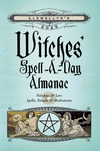POSTED UNDER Moon
New Year Moon Spell
Color of the day: Gold Incense of the day: Cinnamon Incense of the day: Cinnamon The Islamic calendar is purely lunar. It recognizes twelve months, each of which starts at the first sighting of each New Moon. Therefore, the weather can affect the sighting, so in this calendar it is almost impossible to do more than estimate the date of the New Year in advance of the actual day. If the skies are clear today though, it will be the start of the first month of the year 1425 on the Hijri calendar. It is called Hijri because in Islam the calendar starts with the Hijri, the event that marks the beginning of the Islamic religion. This is when Mohammed fled from persecution in Mecca by going to Medina. There he was supported by the local Christian and Jewish population and allowed to develop his religion based on the scriptures that were dictated to him by the archangel Gabriel. In the Gregorian calendar this happened in the year 622. Except in Saudi Arabia and a few other countries, the Islamic calendar is only used for religious purposes. The New Year is not an important holiday, and not everyone chooses to celebrate it. This indifference toward the New Year seems ironic when we realize that the oldest recorded New Year's celebration comes from this area of the world. Four thousand years ago in Babylon, the people began an eleven-day New Year's festival on our March 23 by stripping the king of his clothes and sending him away. For eleven days the people did what-ever they liked. On the last day, the king returned wearing splendid robes, and everyone went back to work. |
Related Product
by Llewellyn
A Spell a Day Keeps the Monotony at Bay
Cast yourself an exciting year one spell at a time with this collection of new workings, recipes, rituals, and meditations. Crafted with simplicity in mind,...
Link to this spell: http://www.llewellyn.com/spell.php?spell_id=1376
